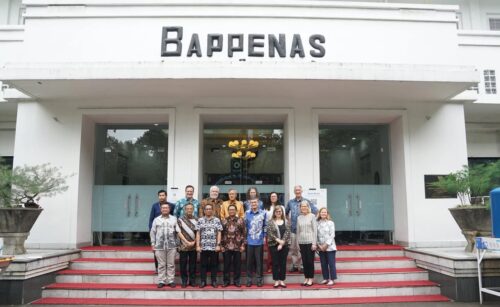Feb. 23, 2023
A University of Rhode Island connection, a half-century strong, started with questions of maritime boundaries in the Indian Ocean. As the 1970s dawned, URI marine faculty were asked to advise on the matter, forging a connection that would ultimately cross 9,500 miles and five decades.
That connection was celebrated in a visit by University faculty, staff, and students, and the Republic of Indonesia in January, as the island nation and the island state celebrated a half century of partnership and knowledge exchange. Several URI community members traveled to Indonesia to advance existing partnerships, including President Marc Parlange and students in a J Term study abroad program, examining biodiversity, environmental issues, and geologic hazards in the region.

“URI has developed a tremendous partnership with Indonesia,” says Kristin Johnson, vice provost for global initiatives, who helped lead the visit.
J.P. Walsh, director of URI’s Coastal Resources Center and professor at URI’s Graduate School of Oceanography, says, “Indonesia is a vast nation comprising thousands of islands and beautiful, bountiful waters; like Rhode Island, its coasts and ocean are vital to its culture, economy, sustenance, and sustainability. We have common challenges such as pollution problems, over-use and climate change, and have much we can learn and share with Indonesian students, researchers and other citizens.”
“The visit was important to reestablish connections and renew agreements with a number of institutions in Indonesia,” says John Kirby, dean of the College of the Environment and Life Sciences, noting that the visit was important due to limited interactions during the pandemic. “The visit was also effective in demonstrating the successes and depth of our 50-year relationship to our colleagues at the U.S. Embassy.”
URI set up faculty visits to several sites to establish and continue research and outreach opportunities. The visit also put into place a new generation of partnerships with local governments; URI officials signed several new agreements while there. The visit was a reciprocal one after a delegation from Indonesia visited Rhode Island in May.
One highlight of the trip came in Papua when the University held an event for the parents of Indonesian students currently attending URI. URI’s visit was meaningful for families there, several of whom traveled hundreds of miles to attend the events. The University held a ceremony of recognition for the families, and nearly 100 parents of current and former students attended.
“Research is as much about building relationships and sharing knowledge with students, colleagues and the public as it is about collecting data and analyzing results,” Walsh says. “It is invaluable for URI to grow its global research enterprise. Indonesia has incredibly complex and dynamic ocean areas from the active volcanic zones of Aceh to the productive coast of Papua. There is so much to explore and study in partnership there.”
Johnson echoes the importance of economic engagement in that part of the world for New England and the United States. “It’s important for URI to be a global presence,” Johnson says. “Our connections in Southeast Asia represent unprecedented impact and a unique academic opportunity.”
The region offers unparalleled research opportunities. URI faculty are currently sharing expertise and researching in a number of fields: oceanography, geology, fisheries, and coastal resources, even pharmacy and tourism.
The visit also gave URI the chance to connect with its extensive alumni network there, many of whom now play key roles in the national government and agencies in the country. Michele Nota, vice president for alumni engagement, and Lil Breul O’Rourke, president of the URI Foundation & Alumni Engagement, were members of the delegation and met with alumni who, despite the years and miles, feel a very strong connection to URI and Rhode Island.
“Our partnership with the Republic of Indonesia has offered invaluable opportunities for research, learning, and teaching that have yielded real-world solutions to pressing local and global issues,” says URI President Marc Parlange. “It was terrific to see the important work being done and meet the people who are making significant strides in areas like the Blue Economy. The vast and rich ocean resources that we have in common will continue to fuel more important work between URI and our Indonesian partners in the years to come, and I look forward to expanding on the successes of this collaboration.”
